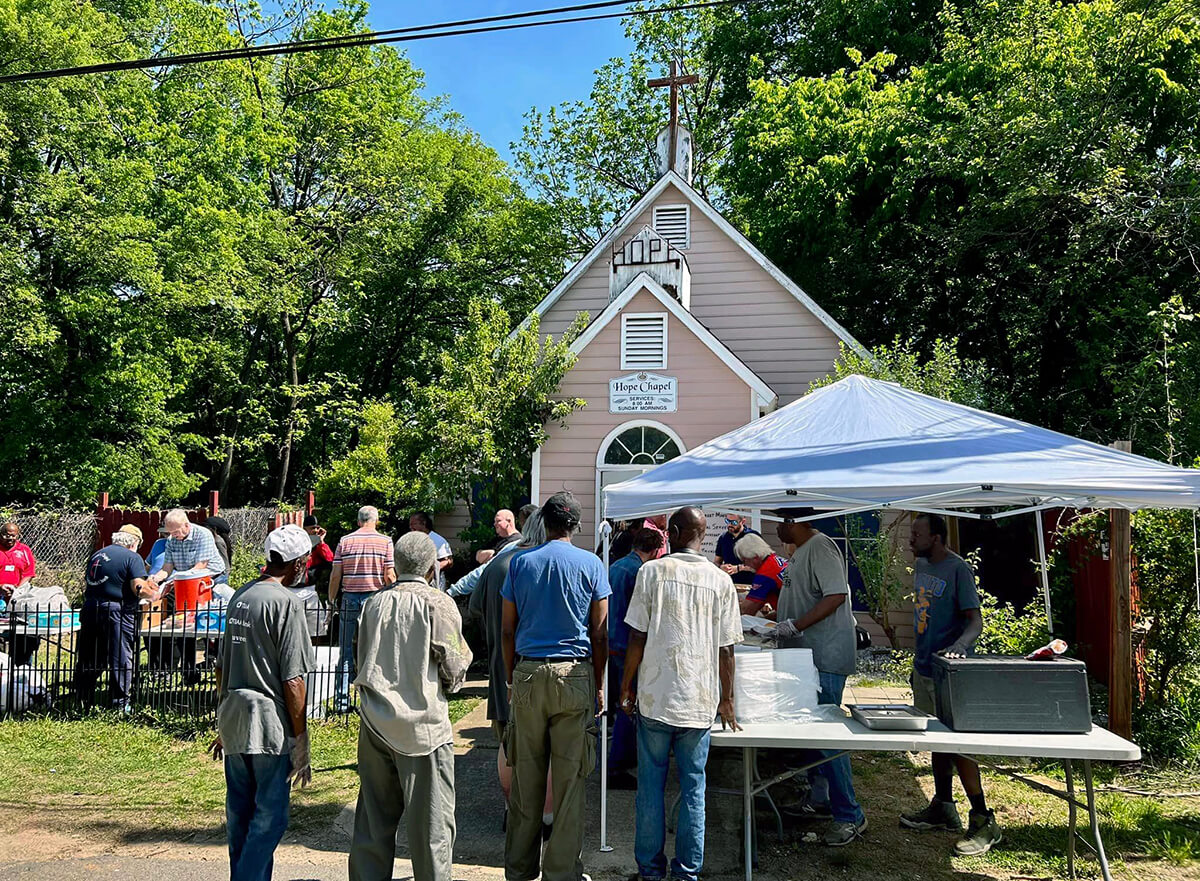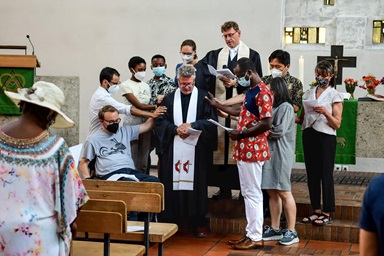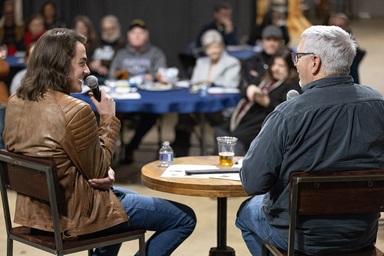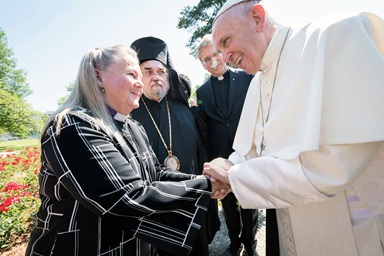Key points:
- A ministry at tiny Hope Chapel is doing mighty things in its Charlotte, North Carolina, community, feeding and clothing people without judgment or intent to recruit them as church members.
- Not far away, Providence United Methodist Church hosted the first national conference of the Fresh Expressions movement, which stresses the need for street-level ministries even if they don’t grow a church.
- There is room for traditional churches and new approaches to ministry, says Bishop Tom Berlin.
Up a hill from tiny Hope Chapel is Roof Above, which shelters 300 homeless men most nights. To its right is a fence protecting a construction site that will soon be “luxury housing,” in the parlance of developers.
A yellow sign on the road leading to the construction site says, “Dead End.”
But maybe this doesn’t have to be a dead end for Hope Chapel, which developers have tried to purchase, presumably so it can be demolished in the interests of gentrification. The chapel, part of the Word on the Street ministry run by the Rev. Charles DiRico, feeds all-comers four days a week, two at the chapel and two elsewhere in the community. It also maintains a clothing bank available to people who are homeless.
The Baptist owners of Hope Chapel, which used to be one of their churches, have told the developers they’re not interested in selling.
Instead, the owners plan to continue letting DiRico and Word on the Street use it. DiRico, a United Methodist of indefatigable good cheer, envisions the future of the site as a coffee shop catering to the wealthy new neighbors. Taking it further, he imagines men from the shelter could work there, selling coffee to the luxury housing folks.
“If you're going to buy an $8 cup of coffee, why not give it to Roof Above instead of Starbucks? You know what I mean?” DiRico says.
Ruth, a Fresh Expressions success story
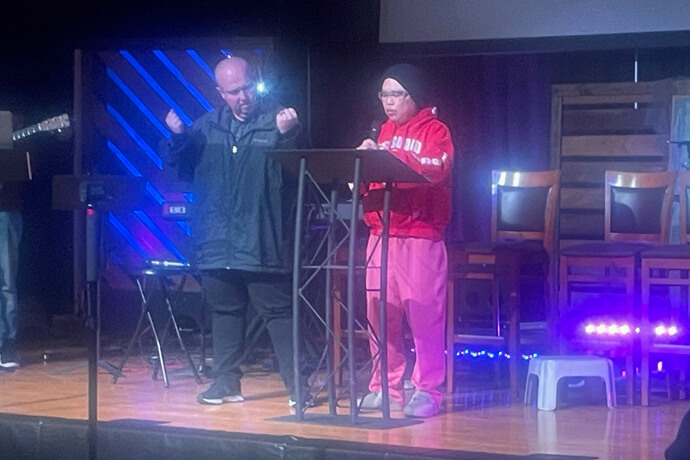
On the cool evening of Feb. 7, Ruth Hsieh, a petite woman from Taiwan dressed in a brightly colored hoodie and black beanie, offered a prayer inside the Hope Chapel, which is dominated by a large, rather garish mural of Christ suffering on the cross.
By way of explanation, one of the dozen or so people in attendance explained the painting by asserting it was “painted by a Baptist.”
“Jesus needs our working bodies as the church’s agents, who he keeps ongoing and alive,” Hsieh prayed. “Please help our brothers and sisters in Christ over this beautiful land, the U.S.A., to have a real revival.”
Such an arrangement could bring different classes of people into proximity, and who knows what good might develop from those relationships?
“This is a dream, right? Gosh, I would love for something like this to happen,” he adds.
“We may even (build) a whole new building and do a drive-through, but make it to where we open up 6 a.m. to 2 p.m. Close early afternoon like a lot of coffee shops, and then we can still do our ministry here, but do more of it and have a newer facility,” DiRico said.
Is this a pipe dream? Perhaps. But just down the road, the upscale Providence United Methodist Church is hosting the first national conference of the United Methodist Fresh Expressions movement, which lifts up this kind of ministry as an important part of the denomination’s future.
And also, its past.
Meeting people where they are instead of trying to lure them to church has roots to the very beginning of Methodism, preached the Rev. Michael Adam Beck at the conference on Feb. 8. Beck leads Fresh Expressions United Methodist under the auspices of United Methodist Discipleship Ministries.
“Wesley says, ‘I don't want to go out in the field and preach. I love the commodious room. I love the handsome pulpit. I’m a respectable Anglican priest,’” Beck quotes the founder of Methodism.
“But then he finally caves and does it and thousands of people show up to hear the sermon,” Beck continues. “We were born out of this realization that people are not coming to the church.”
Beck believes outreach and missionary work don’t necessarily require an elaborate structure or bureaucracy. In fact, social wholeness was practiced from the beginning.
“It started with feeding the hungry,” he said. “It was not just a place where they came to worship but where people were fed, where the naked were clothed, where people that were illiterate learned how to read.”
Subscribe to our
e-newsletter
A handful of Fresh Expressions participants visited Hope Chapel one evening during the conference. Inside, they shared pizza with five men — some of them homeless and all getting some of their weekly meals at Hope Chapel.
“We’ve had guys who come in off the construction site and get in line to get a meal,” DiRico said. “The folks who help us were like, ‘What’s this about?’
And I was like, you don't even know what's going on in their life. They might not be homeless, but they might not be getting paid as much as you think or it might not be steady.”
Whole families living in their cars drive up to get a meal, DiRico said.
No one knows if these people are Christians, much less Methodists. No one asks.
So despite the use of one small structure, Word on the Street is a textbook Fresh Expressions ministry, more concerned with its mission than helping an institution prolong itself.
And that’s OK, say Fresh Expressions leaders back at the conference.
“We need a true blended ecology, where the church steps toward the research and says, ‘Let's do anything to make it work and to bring healing and the transformation of Jesus Christ into our communities,’” said Florida Conference Bishop Tom Berlin.
“We can bless people and help them change in Christ, and we can bless the church and help it find its vitality again. We can do both.”
Patterson is a UM News reporter in Nashville, Tennessee. Contact him at 615-742-5470 or [email protected]. To read more United Methodist news, subscribe to the free Daily or Weekly Digests.

